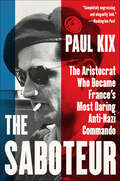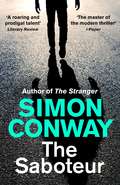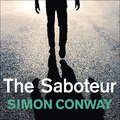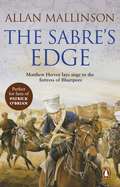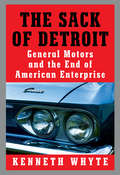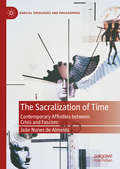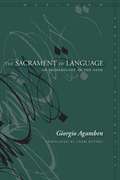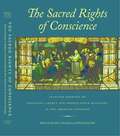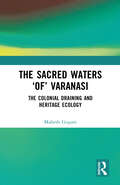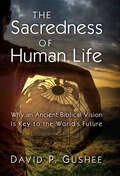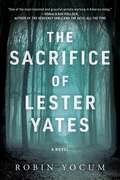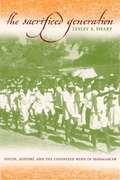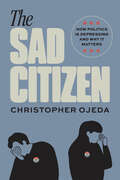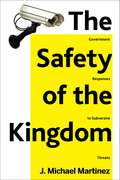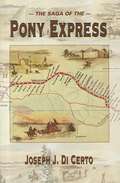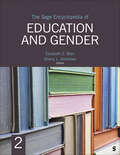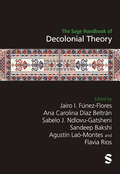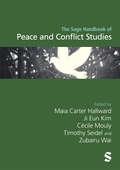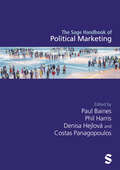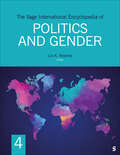- Table View
- List View
The Saboteur: The Aristocrat Who Became France's Most Daring Anti-Nazi Commando
by Paul KixIn the tradition of Agent Zigzag comes this breathtaking biography, as fast-paced and emotionally intuitive as the very best spy thrillers, which illuminates an unsung hero of the French Resistance during World War II—Robert de La Rochefoucald, an aristocrat turned anti-Nazi saboteur—and his daring exploits as a résistant trained by Britain’s Special Operations Executive.A scion of one of the most storied families in France, Robert de La Rochefoucald was raised in magnificent chateaux and educated in Europe's finest schools. When the Nazis invaded and imprisoned his father, La Rochefoucald escaped to England and learned the dark arts of anarchy and combat—cracking safes and planting bombs and killing with his bare hands—from the officers of Special Operations Executive, the collection of British spies, beloved by Winston Churchill, who altered the war in Europe with tactics that earned it notoriety as the “Ministry of Ungentlemanly Warfare.” With his newfound skills, La Rochefoucauld returned to France and organized Resistance cells, blew up fortified compounds and munitions factories, interfered with Germans’ war-time missions, and executed Nazi officers. Caught by the Germans, La Rochefoucald withstood months of torture without cracking, and escaped his own death, not once but twice.The Saboteur recounts La Rochefoucauld’s enthralling adventures, from jumping from a moving truck on his way to his execution to stealing Nazi limos to dressing up in a nun’s habit—one of his many disguises and impersonations. Whatever the mission, whatever the dire circumstance, La Rochefoucauld acquitted himself nobly, with the straight-back aplomb of a man of aristocratic breeding: James Bond before Ian Fleming conjured him.More than just a fast-paced, true thriller, The Saboteur is also a deep dive into an endlessly fascinating historical moment, telling the untold story of a network of commandos that battled evil, bravely worked to change the course of history, and inspired the creation of America’s own Central Intelligence Agency.
The Saboteur: The gripping follow-up to a TIMES thriller of the year
by Simon ConwayA stunning, apocalyptic standalone sequel to The Stranger.'A superb writer, with great imagination, inventiveness and the ability to portray events with simplicity and urgency' - Michael Jecks, author of Act of Vengeance'Conway has created, with Jude Lyon, a very modern hero, and one who will run for many more stories, I hope. Basically, if you are going to read any thriller this year, make it this one' - Shots MagazineThe terrorist Guy Fowle has escaped from prison.Jude Lyon of MI-6 has been saved from a Syrian ambush by his lover - and enemy? - Julia Ermolaeva. A mysterious Russian has been murdered in London and his thumb cut off.The Chancellor of the Exchequer has made an unfortunate social connection at a party, which he hopes he can keep secret.And suddenly, the world is literally going up in flames.Jude needs to start putting together the pieces of this jigsaw and quickly, because someone is putting into play a terrifying Russian plan to disable and destroy the UK. Once it has begun, it is designed to be impossible to stop.Bad enough if that someone is the Russian government. Worse if it is the psychopathic genius Fowle, otherwise known as The Stranger.Packed with stunning action, political intrigue, authentic tradecraft, emotion, shocks and nail-biting suspense, The Saboteur takes the spy thriller to new heights.
The Saboteur: The gripping follow-up to a TIMES thriller of the year (Jude Lyon)
by Simon ConwayA stunning, apocalyptic standalone sequel to The Stranger.'There's a healthy crop of younger spy writers just now, and Simon Conway is among the pick of the bunch. His military background renders the action scenes bloodily and the novel's apocalyptic scenario all too plausibly . . . Fire in the hole' - The Times'A superb writer, with great imagination, inventiveness and the ability to portray events with simplicity and urgency' - Michael Jecks, author of Act of Vengeance'Conway has created, with Jude Lyon, a very modern hero, and one who will run for many more stories, I hope. Basically, if you are going to read any thriller this year, make it this one' - Shots MagazineThe terrorist Guy Fowle has escaped from prison.Jude Lyon of MI-6 has been saved from a Syrian ambush by his lover - and enemy? - Julia Ermolaeva. A mysterious Russian has been murdered in London and his thumb cut off.The Chancellor of the Exchequer has made an unfortunate social connection at a party, which he hopes he can keep secret.And suddenly, the world is literally going up in flames.Jude needs to start putting together the pieces of this jigsaw and quickly, because someone is putting into play a terrifying Russian plan to disable and destroy the UK. Once it has begun, it is designed to be impossible to stop.Bad enough if that someone is the Russian government. Worse if it is the psychopathic genius Fowle, otherwise known as The Stranger.Packed with stunning action, political intrigue, authentic tradecraft, emotion, shocks and nail-biting suspense, The Saboteur takes the spy thriller to new heights.
The Saboteur: a Financial Times Best Thriller of 2021 (Jude Lyon #2)
by Simon ConwayA stunning, apocalyptic standalone sequel to The Stranger.The terrorist Guy Fowle has escaped from prison.Jude Lyon of MI-6 has been saved from a Syrian ambush by his lover - and enemy? - Julia Ermolaeva. A mysterious Russian has been murdered in London and his thumb cut off.The Chancellor of the Exchequer has made an unfortunate social connection at a party, which he hopes he can keep secret.And suddenly, the world is literally going up in flames.Jude needs to start putting together the pieces of this jigsaw and quickly, because someone is putting into play a terrifying Russian plan to disable and destroy the UK. Once it has begun, it is designed to be impossible to stop.Bad enough if that someone is the Russian government. Worse if it is the psychopathic genius Fowle, otherwise known as The Stranger.Packed with stunning action, political intrigue, authentic tradecraft, emotion, shocks and nail-biting suspense, The Saboteur takes the spy thriller to new heights.(P)2021 Hodder & Stoughton Limited
The Sabre's Edge: (The Matthew Hervey Adventures: 5):A gripping, action-packed military adventure from bestselling author Allan Mallinson (Matthew Hervey #5)
by Allan MallinsonThe Sunday Times bestselling author Allan Mallinson, brings us another enthralling Matthew Hervey adventure. If you like Patrick O'Brian, Bernard Cornwell and CS Forester, you will love this!"What a hero! What an author! What a book! A joy for the lover of adventure and military buff alike" -- LYN MACDONALD, THE TIMES"Splendid...the tale is as historically stimulating as it is stirringly exciting" -- ANDREW ROBERTS, SUNDAY TELEGRAPH"Impeccably researched and rooted in both time and place" -- ***** Reader review"A thrilling tale" -- ***** Reader review"Allan Malinson tells an absorbing tale and gives a wonderful insight into life at that time." -- ***** Reader review********************************************************************India, 1824: Matthew Hervey and the 6th Light Dragoons are stationed in India, where conflagration looks set to flair.The usurper prince, Durjan Sal, has taken refuge in the infamous fortress of Bhurtpore. A deep ditch, which can be flooded at a moment's notice, runs round it - and as its notorious Tower of Victory - built with the skulls of defeated men - bears witness, it has withstood all attacks made on it.Until now. Hot and dangerous work lies ahead for Matthew Hervey and his courageous troop who know their fortunes will be decided by the sabre's edge.A Sabre's Edge is the fifth book in Allan Mallinson's Matthew Hervey series. His adventures continue in Rumours of War. Have you read his previous adventures A Close Run Thing, The Nizam's Daughters, A Regimental Affair and A Call to Arms?
The Sack of Detroit: General Motors and the End of American Enterprise
by Kenneth WhyteA provocative, revelatory history of the epic rise—and unnecessary fall—of the U.S. automotive industry, uncovering the vivid story of innovation, politics, and business that led to a sudden, seismic shift in American priorities that is still felt today, from the acclaimed author of Hoover In the 1950s, America enjoyed massive growth and affluence, and no companies contributed more to its success than automakers. They were the biggest and best businesses in the world, their leadership revered, their methods imitated, and their brands synonymous with the nation's aspirations. But by the end of the 1960s, Detroit's profits had evaporated and its famed executives had become symbols of greed, arrogance, and incompetence. And no company suffered this reversal more than General Motors, which found itself the main target of a Senate hearing on auto safety that publicly humiliated its leadership and shattered its reputation. In The Sack of Detroit, Kenneth Whyte recounts the epic rise and unnecessary fall of America's most important industry. At the center of his absorbing narrative are the titans of the automotive world but also the crusaders of safety, including Ralph Nader and a group of senators including Bobby Kennedy. Their collision left Detroit in a ditch, launched a new era of consumer advocacy and government regulation, and contributed significantly to the decline of American enterprise. This is a vivid story of politics, business, and a sudden, seismic shift in American priorities that is still felt today.
The Sacralization of Time: Contemporary Affinities between Crisis and Fascism (Radical Theologies and Philosophies)
by João Nunes de AlmeidaIn this book, João Nunes de Almeida rethinks the relationship between crisis and fascism in today’s liberal democratic societies. Arguing that fascism has adapted to a post-modern idea of endless crisis, Almeida challenges one of the strongest liberal myths in western politics, namely that fascism and liberal democracy have different roots. Fascism, in Almeida’s view, is at the center of the very production of social relations in western capitalist societies, and is the result of the very desire to be saved from crisis underlying liberal democracy. It draws on stormy examples from Portugal’s contemporary history, with a particular focus on its fascist past and revolution, to explore affinities between crisis and fascism in other spatial and historical contexts. João Nunes de Almeida concludes that refusing to be saved from crisis becomes the refusal of any form of fascism in a more global context.
The Sacrament of Language: An Archaeology of the Oath
by Giorgio Agamben Adam KotskoThis book is a continuation of Giorgio Agamben's investigation of political theory, which began with the highly influential volume Homo Sacer: Sovereign Power and Bare Life. Having already traced the roots of the idea of sovereignty, sacredness, and economy, he now turns to a perhaps unlikely topic: the concept of the oath. Following the Italian scholar Paolo Prodi, Agamben sees the oath as foundational for Western politics and undertakes an exploration of the roots of the phenomenon of the oath in human experience. He rejects the common idea that the oath finds its origin in religion, arguing instead that the oath points toward a particular response to the experience of language, a response that gave birth to both religion and law as we now know them. This book is important not only for readers of Agamben or of continental philosophy more broadly, but for anyone interested in questions relating to the relationships among religion, law, and language.
The Sacred Rights of Conscience: Selected Readings on Religious Liberty and Church-State Relations in the American Founding
by Mark David Hall Daniel L. DreisbachReligion is woven tightly into the fabric of the American experiment. In the traditional telling of the story, early colonists crossed the Atlantic Ocean's treacherous waters to escape religious persecution in the Old World and to search for religious liberty in the New World.
The Sacred Waters ‘of’ Varanasi: The Colonial Draining and Heritage Ecology
by Mahesh GogateThis book on urban water bodies, catchment areas and drainage pattern is set against the backdrop of the unprecedented heavy rainfall that severely deluged metropolitan cities and other parts of India in recent years. The recurring natural catastrophes in water-stressed cities of India and alarming rate of diminishing water bodies, wetlads and catchment areas needs a re-visit to an entire urban water-cycle. This book, thus, discusses how the processes and implementation of colonial urban development policies and projects have radically transformed the water bodies and their catchment areas – traditional water holding systems of Varanasi city. In this imperative colonial process, through the case study of Varanasi, the book mainly engages with the reasons behind the elimination of the temple tanks and ponds after the annexation of Varanasi by the British from 1775 till 1947. The book investigates the colonial notion of ‘dry city’, and how this notion crafted the process of separating land and water bodies, which arguably resulted in the reclamation and draining of water bodies, and also gave rise to water pollution. Additionally, the book analyzes the elimination of water bodies and loss of catchment areas through the ongoing processes of restoring the ancient city’s natural and cultural heritage. Print edition not for sale in South Asia (India, Sri Lanka, Nepal, Bangladesh, Pakistan and Bhutan)
The Sacredness of Human Life: Why an Ancient Biblical Vision Is Key to the World's Future
by David P. GusheeThis authoritative book is the most comprehensive examination ever of the sacredness of human life. Never before has one volume explored this subject in such a multifaceted way, encompassing biblical roots, theological elaborations, historical cases, and contemporary ethical perspectives. Tracing the concept of the sacredness of human life from Scripture through church history to the present day, David Gushee argues that viewing human life as sacred is one of the most precious legacies of biblical faith — albeit one that the church has too often failed to uphold. Besides providing a masterful historical survey, Gushee’s discussion covers the many current ethical challenges and perspectives that will impact the survival and flourishing of human life, including biotechnology, the death penalty, abortion, human rights, nuclear weapons, just war theory, women’s rights, and creation care.Gushee’s Sacredness of Human Life is a game-changing book that will set the standard for all future discussions of this key ethical concept.
The Sacrifice of Lester Yates: A Novel
by Robin YocumA new political thriller from the author of bestselling novel The Essay. Lester Yates is the notorious Egypt Valley Strangler, one of the country&’s most prolific serial killers. Or, is he? Yates is two months from his date with the executioner when Ohio Attorney General Hutch Van Buren is presented with evidence that could exonerate him. But Yates is a political pawn, and forces exist that don&’t want him exonerated, regardless of the evidence. To do so could derail presidential aspirations and change the national political landscape. Yates&’ execution will clear a wide political path for many influential people, including Van Buren, who must battle both the clock and a political machine of which he is a part. Robin Yocum has been compared with E. Annie Proulx for his authenticity of place, and Elmore Leonard for his well-laid plots and perfect pacing. Arcade is thrilled to publish The Sacrifice of Lester Yates, which is Yocum at his best: suspenseful, political, and smart.
The Sacrificed Generation: Youth, History, and the Colonized Mind in Madagascar
by Lesley A. SharpYouth, historical consciousness, and political agency in independent Francophone Africa are the themes that frame this study about Madagascar.
The Sad Citizen: How Politics Is Depressing and Why It Matters
by Christopher OjedaFor many citizens, politics is depressing. How has this come to be the norm? And, how is it influencing democracy? From rising polarization to climate change, today’s politics are leaving many Western democracies in the throes of malaise. While anger, anxiety, and fear are loud emotions that powerfully activate voters, depression is quiet, demobilizing, and less visible as a result. Yet its pervasiveness is cause for concern: after all, democracy should empower citizens. In The Sad Citizen, Christopher Ojeda draws on wide-ranging data from the United States and beyond to explain how politics is depressing, why this matters, and what we can do about it. Integrating insights from political science, sociology, psychology, and other fields, The Sad Citizen exposes the unhappy underbelly of contemporary politics and offers fresh ideas to strengthen democracy and help citizens cope with the stress of politics.
The Safety of the Kingdom: Government Responses to Subversive Threats
by J. Michael MartinezThe horrendous events of September 11, 2001, heightened awareness of terrorism unlike all but a handful of major catastrophes in American history. Like the Japanese attack on Pearl Harbor on December 7, 1941, and President Kennedy’s assassination on November 22, 1963, 9/11 is a date forever enshrined in our national memory. But 9/11 once again raised the question: What should government do to eliminate or reduce the likelihood of a future attack? How should national leadership balance its responsibility to protect the civil liberties of U. S. citizens with its sworn duty to protect their lives? In The Safety of the Kingdom, J. Michael Martinez takes up the question of how the United States government has responded to terrorist attacks and, in the absence of an attack, the fear of foreign and subversive elements that may harm the nation. In some cases, the government "overreaction” led to a series of abuses that amplified the severity of the original threat. Rather than selecting every instance of government reaction to threats, Martinez examines representative cases, from the alien and sedition acts in the eighteenth century to the post-9/11 "war on terror. ” Edward Snowden’s disclosure of classified information related to the NSA’s surveillance program brought to the fore an important debate about government scrutiny of its citizens. As J. Michael Martinez makes clear in this book, it is a debate that has been ongoing for centuries. Skyhorse Publishing, as well as our Arcade imprint, are proud to publish a broad range of books for readers interested in history--books about World War II, the Third Reich, Hitler and his henchmen, the JFK assassination, conspiracies, the American Civil War, the American Revolution, gladiators, Vikings, ancient Rome, medieval times, the old West, and much more. While not every title we publish becomes a New York Times bestseller or a national bestseller, we are committed to books on subjects that are sometimes overlooked and to authors whose work might not otherwise find a home.
The Saga of the Pony Express
by Joseph J. Di CertoAlthough the Pony Express operated for only eighteen months, during 1860 and 1861, it has become an enduring legend in the American imagination. di Certo traces the history of "the Pony", beginning with the earliest attempts to set up relay mail services in the west and ending with the establishment of telegraph service across the country. He provides detailed information about the route of the Pony Express, the stations along the way, and the Pony riders. Many stories of heroic adventures are included.
The Sage Encyclopedia of Education and Gender
by Sherry L. Deckman Elizabeth E. BlairGender is a prominent and often-contested issue in educational settings across the globe. While understandings of gender and academic and professional potential, roles and expectations, and opportunities and abilities have greatly expanded over the past century in various contexts, schools remain sites of intense conflict around definitions of gender and gendered access and expression. For example, in the US there is growing public backlash against recognizing gender diversity in schools, with educators being called to make their teaching more inclusive, while schools debate what representations are permissible and parents bring legal action against school districts over recognizing students’ chosen gender expression. Furthermore, educational access and outcomes have nuanced gendered patterns to which educators and educational researchers must be attentive. For example, in India, growing literacy rates among youth now show gender parity, while across age groups men show higher literacy rates than women. In Afghanistan, girls have recently been restricted from attending school. Globally, school attendance among youth who menstruate is reduced because of lack of access to menstrual health products. In the US (and many Western countries), women are more likely to graduate high school and college than men, with the US showing the greatest degree attainment disparities between women and men of color. However, US women still advance in STEM fields at persistently lower rates than men, a pattern contrasted by the rapid rise of women earning the majority of STEM degrees in China. These examples begin to show the nuance of gendered educational patterns, with perspectives growing in complexity as our understandings of gender shift and change, moving beyond the traditional gender binary. Yet, despite rapid changes in gendered educational patterns and in how education scholars conceptualize and study gender, the field lacks a recent, comprehensive resource text. This two-volume encyclopedia, a unique compendium on gender and education with an expansive and inclusive approach, will address this urgent need. Featuring a broad range of 250-300 well-researched, short articles written by global experts in the field, this much-needed guide will be an essential, first-stop resource for students and scholars exploring issues of gender and education, as well as educators caught in a rapidly changing and nuanced field. A central strength of this encyclopedia will be its broad, nuanced, and inclusive exploration of gender. Entries will explore topics of gender and education comprehensively, through an intersectional lens, covering issues of gender equity, identity, and inclusivity in education that impact women, girls, men, boys, trans, genderqueer, and nonbinary people. As education is an interdisciplinary field, the Encyclopedia will draw from perspectives in sociology, anthropology, psychology, policy studies, leadership, philosophy, history, economics, law, curriculum studies, public health, race & ethnic studies, and women, gender, & queer studies.
The Sage Encyclopedia of Education and Gender
by Sherry L. Deckman Elizabeth E. BlairGender is a prominent and often-contested issue in educational settings across the globe. While understandings of gender and academic and professional potential, roles and expectations, and opportunities and abilities have greatly expanded over the past century in various contexts, schools remain sites of intense conflict around definitions of gender and gendered access and expression. For example, in the US there is growing public backlash against recognizing gender diversity in schools, with educators being called to make their teaching more inclusive, while schools debate what representations are permissible and parents bring legal action against school districts over recognizing students’ chosen gender expression. Furthermore, educational access and outcomes have nuanced gendered patterns to which educators and educational researchers must be attentive. For example, in India, growing literacy rates among youth now show gender parity, while across age groups men show higher literacy rates than women. In Afghanistan, girls have recently been restricted from attending school. Globally, school attendance among youth who menstruate is reduced because of lack of access to menstrual health products. In the US (and many Western countries), women are more likely to graduate high school and college than men, with the US showing the greatest degree attainment disparities between women and men of color. However, US women still advance in STEM fields at persistently lower rates than men, a pattern contrasted by the rapid rise of women earning the majority of STEM degrees in China. These examples begin to show the nuance of gendered educational patterns, with perspectives growing in complexity as our understandings of gender shift and change, moving beyond the traditional gender binary. Yet, despite rapid changes in gendered educational patterns and in how education scholars conceptualize and study gender, the field lacks a recent, comprehensive resource text. This two-volume encyclopedia, a unique compendium on gender and education with an expansive and inclusive approach, will address this urgent need. Featuring a broad range of 250-300 well-researched, short articles written by global experts in the field, this much-needed guide will be an essential, first-stop resource for students and scholars exploring issues of gender and education, as well as educators caught in a rapidly changing and nuanced field. A central strength of this encyclopedia will be its broad, nuanced, and inclusive exploration of gender. Entries will explore topics of gender and education comprehensively, through an intersectional lens, covering issues of gender equity, identity, and inclusivity in education that impact women, girls, men, boys, trans, genderqueer, and nonbinary people. As education is an interdisciplinary field, the Encyclopedia will draw from perspectives in sociology, anthropology, psychology, policy studies, leadership, philosophy, history, economics, law, curriculum studies, public health, race & ethnic studies, and women, gender, & queer studies.
The Sage Handbook of Decolonial Theory
by Sabelo J. Ndlovu-Gatsheni Sandeep Bakshi Augustin Lao-Montes Flavia Rios Jairo I. Fúnez-Flores Ana Carolina Díaz BeltránThe Sage Handbook of Decolonial Theory is a groundbreaking transdisciplinary resource that expands the epistemological and geographical horizons of decolonial thought. This handbook prioritizes the Global South, fostering South-North and South-South inter-epistemic dialogues and situating decolonial thought in sites of struggle. It builds on decolonial thought and praxis from Latin America and the Caribbean, Africa, Asia, and Palestine, among other regions and countries. Addressing the erasure of knowledge production from the Global South in dominant academic spaces, this handbook brings together decolonial scholars and activist intellectuals from the Global South and engages with politically committed scholars in the Global North. It emphasizes the geopolitics and ethics of knowledge production and the importance of situating one’s work in historically excluded regions and communities. Organized into five parts, the handbook includes conceptual essays and empirical studies on decolonial thought and praxis. It covers a range of topics from (de)coloniality, geopolitics, and transdisciplinarity to decolonial feminisms, gender and sexuality studies, and racial capitalism. The chapters convey a sense of urgency and a committed political voice, demonstrating how decolonial theory can interrogate and intervene in the modern/colonial racial capitalist heteropatriarchal world. The Sage Handbook of Decolonial Theory is not just for academics; it is written for anyone interested in radical thought and praxis. It recognizes decolonial theory as a plural and dynamic field, concerned with power hierarchies, historiography, and epistemological critiques of Eurocentrism. Ultimately, it teaches us how to think with and act alongside struggles for liberation. Part I: Key Debates in Decolonial Theory Part II: Geopolitics and Geographies Part III: Transdisciplinarity Part IV: Feminisms, Genders, & Sexualities Part V: Racial Capitalism
The Sage Handbook of Decolonial Theory
by Sabelo J. Ndlovu-Gatsheni Sandeep Bakshi Augustin Lao-Montes Flavia Rios Jairo I. Fúnez-Flores Ana Carolina Díaz BeltránThe Sage Handbook of Decolonial Theory is a groundbreaking transdisciplinary resource that expands the epistemological and geographical horizons of decolonial thought. This handbook prioritizes the Global South, fostering South-North and South-South inter-epistemic dialogues and situating decolonial thought in sites of struggle. It builds on decolonial thought and praxis from Latin America and the Caribbean, Africa, Asia, and Palestine, among other regions and countries. Addressing the erasure of knowledge production from the Global South in dominant academic spaces, this handbook brings together decolonial scholars and activist intellectuals from the Global South and engages with politically committed scholars in the Global North. It emphasizes the geopolitics and ethics of knowledge production and the importance of situating one’s work in historically excluded regions and communities. Organized into five parts, the handbook includes conceptual essays and empirical studies on decolonial thought and praxis. It covers a range of topics from (de)coloniality, geopolitics, and transdisciplinarity to decolonial feminisms, gender and sexuality studies, and racial capitalism. The chapters convey a sense of urgency and a committed political voice, demonstrating how decolonial theory can interrogate and intervene in the modern/colonial racial capitalist heteropatriarchal world. The Sage Handbook of Decolonial Theory is not just for academics; it is written for anyone interested in radical thought and praxis. It recognizes decolonial theory as a plural and dynamic field, concerned with power hierarchies, historiography, and epistemological critiques of Eurocentrism. Ultimately, it teaches us how to think with and act alongside struggles for liberation. Part I: Key Debates in Decolonial Theory Part II: Geopolitics and Geographies Part III: Transdisciplinarity Part IV: Feminisms, Genders, & Sexualities Part V: Racial Capitalism
The Sage Handbook of Peace and Conflict Studies
by Maia Carter Hallward Zubairu Wai Timothy Seidel Cécile Mouly Ji Eun KimThe Sage Handbook of Peace and Conflict Studies offers a comprehensive exploration of the complexities of violence, conflict, and peace from a global, interdisciplinary perspective. The handbook addresses the traditional Western-centric approach while emphasizing the need to integrate Global South perspectives to create a more inclusive and transformative understanding of peace and conflict. While important voices in peace and conflict studies have long stressed the need to not only address direct violence but also structural and cultural one, certain strands of the field have upheld conservative knowledge production and reinforced unequal power structures. This volume seeks to challenge these biasesby foregrounding critical and decolonial approaches that emphasize gender, race, culture, global history, and political economy. Its diverse chapters invite us to question mainstream assumptions and promote a broader, more inclusive analysis of peace and conflict. The handbook explores the evolution of the field, highlighting the impact of historical events and the role of oppositional knowledge in political change. It offers a critical overview of theoretical approaches, emphasizing reflexivity, inclusivity, and the importance of local actors in peace and conflict dynamics. Additionally, it examines how cultural and disciplinary assumptions shape peacebuilding and conflict transformation, and it critiques traditional global narratives on issues like governance, climate change, and human rights. Finally, the handbook presents real-world case studies that integrate themes of decoloniality, race, gender, and power inequalities across diverse global contexts. By centering the Global South and integrating interdisciplinary perspectives, this handbook provides valuable insights for scholars and practitioners committed to fostering a more equitable and just world. Section 1: History, Knowledge, and Power in Peace and Conflict Studies Section 2: Theory and Analysis in Peace and Conflict Studies Section 3: Practices and Approaches in Peace and Conflict Studies Section 4: Global Issues, Institutions, and Change in Peace and Conflict Studies Section 5: Case Studies in Peace and Conflict Studies
The Sage Handbook of Peace and Conflict Studies
by Maia Carter Hallward Zubairu Wai Timothy Seidel Cécile Mouly Ji Eun KimThe Sage Handbook of Peace and Conflict Studies offers a comprehensive exploration of the complexities of violence, conflict, and peace from a global, interdisciplinary perspective. The handbook addresses the traditional Western-centric approach while emphasizing the need to integrate Global South perspectives to create a more inclusive and transformative understanding of peace and conflict. While important voices in peace and conflict studies have long stressed the need to not only address direct violence but also structural and cultural one, certain strands of the field have upheld conservative knowledge production and reinforced unequal power structures. This volume seeks to challenge these biasesby foregrounding critical and decolonial approaches that emphasize gender, race, culture, global history, and political economy. Its diverse chapters invite us to question mainstream assumptions and promote a broader, more inclusive analysis of peace and conflict. The handbook explores the evolution of the field, highlighting the impact of historical events and the role of oppositional knowledge in political change. It offers a critical overview of theoretical approaches, emphasizing reflexivity, inclusivity, and the importance of local actors in peace and conflict dynamics. Additionally, it examines how cultural and disciplinary assumptions shape peacebuilding and conflict transformation, and it critiques traditional global narratives on issues like governance, climate change, and human rights. Finally, the handbook presents real-world case studies that integrate themes of decoloniality, race, gender, and power inequalities across diverse global contexts. By centering the Global South and integrating interdisciplinary perspectives, this handbook provides valuable insights for scholars and practitioners committed to fostering a more equitable and just world. Section 1: History, Knowledge, and Power in Peace and Conflict Studies Section 2: Theory and Analysis in Peace and Conflict Studies Section 3: Practices and Approaches in Peace and Conflict Studies Section 4: Global Issues, Institutions, and Change in Peace and Conflict Studies Section 5: Case Studies in Peace and Conflict Studies
The Sage Handbook of Political Marketing
by Costas Panagopoulos Paul Baines Phil Harris Denisa HejlovaThe Sage Handbook of Political Marketing is a comprehensive resource that introduces the theory and practice of political marketing in a global, yet simultaneously localized, world. The practice of political marketing has evolved significantly during the 20th and 21st centuries, adapting to the rise of mass media, marketing communication, advertising, and the web. Traditionally dominated by US, European, and Australasian scholars, the field has up-to-now emphasized the Americanisation and professionalisation of campaigning styles. Since the start of the new millennium, however, political marketing has transformed into a data-driven, specialized profession. With increasing digitalisation and the advent of AI, political marketing involves personally targeted, evidence-based messaging with real-time engagement and sentiment analysis. This approach is not limited to democratic regimes but is also widely adopted by authoritarian states worldwide. The handbook addresses the global perspectives on political marketing, covering a myriad of contexts, cultures, and regimes. It encompasses insights into political marketing in regions seldom discussed in the literature, including Zimbabwe, Japan, India, Hong Kong, and Ukraine. These chapters enrich the debate on political marketing’s impact on democracies and its use in non-democratic societies. Organized into four parts, the handbook covers strategy, propaganda, digital evolution, ideology, and contemporary practices in political marketing. It explores topics such as the marketing of ideology, the impact of the internet and social media, the use of AI in political marketing, and the role of fake news and disinformation in campaigns. The handbook addresses the use of political marketing techniques in crisis management, political branding, the measurement of political marketing effects, and political marketing use outside of electoral campaigns. The Sage Handbook of Political Marketing is an essential resource for scholars, practitioners, students, and politicos in general, seeking to understand the complexities of political marketing. It provides a comprehensive and nuanced exploration of the field, equipping readers to engage with the theoretical and practical aspects of political marketing in a rapidly changing world. Part 1: Strategy in Political Marketing: Orthodox and Occidental Perspectives Part 2: Political Marketing, Propaganda, and Digital Evolution: Global South and Eastern European Perspectives Part 3: Ideology in Political Marketing: Advocacy, Movements, Lobbying, and Public Diplomacy Part 4: Contemporary Political Marketing: Cybercampaigning, Fake News and Social Media
The Sage Handbook of Political Marketing
by Costas Panagopoulos Paul Baines Phil Harris Denisa HejlovaThe Sage Handbook of Political Marketing is a comprehensive resource that introduces the theory and practice of political marketing in a global, yet simultaneously localized, world. The practice of political marketing has evolved significantly during the 20th and 21st centuries, adapting to the rise of mass media, marketing communication, advertising, and the web. Traditionally dominated by US, European, and Australasian scholars, the field has up-to-now emphasized the Americanisation and professionalisation of campaigning styles. Since the start of the new millennium, however, political marketing has transformed into a data-driven, specialized profession. With increasing digitalisation and the advent of AI, political marketing involves personally targeted, evidence-based messaging with real-time engagement and sentiment analysis. This approach is not limited to democratic regimes but is also widely adopted by authoritarian states worldwide. The handbook addresses the global perspectives on political marketing, covering a myriad of contexts, cultures, and regimes. It encompasses insights into political marketing in regions seldom discussed in the literature, including Zimbabwe, Japan, India, Hong Kong, and Ukraine. These chapters enrich the debate on political marketing’s impact on democracies and its use in non-democratic societies. Organized into four parts, the handbook covers strategy, propaganda, digital evolution, ideology, and contemporary practices in political marketing. It explores topics such as the marketing of ideology, the impact of the internet and social media, the use of AI in political marketing, and the role of fake news and disinformation in campaigns. The handbook addresses the use of political marketing techniques in crisis management, political branding, the measurement of political marketing effects, and political marketing use outside of electoral campaigns. The Sage Handbook of Political Marketing is an essential resource for scholars, practitioners, students, and politicos in general, seeking to understand the complexities of political marketing. It provides a comprehensive and nuanced exploration of the field, equipping readers to engage with the theoretical and practical aspects of political marketing in a rapidly changing world. Part 1: Strategy in Political Marketing: Orthodox and Occidental Perspectives Part 2: Political Marketing, Propaganda, and Digital Evolution: Global South and Eastern European Perspectives Part 3: Ideology in Political Marketing: Advocacy, Movements, Lobbying, and Public Diplomacy Part 4: Contemporary Political Marketing: Cybercampaigning, Fake News and Social Media
The Sage International Encyclopedia of Politics and Gender
by Lia K. RobertsThis four-volume encyclopedia set is organized to allow the reader to explore gender and politics from an updated interdisciplinary, intersectional, and global perspective. The organization format will be an A-Z approach of approximately 500-600 entries (with entries ranging in word count from 1,500-3,000 words, with some entries on foundational topics at around 5,000). Coverage will examine both the role gender plays within the realm of politics (political participation, leadership, etc.) as well as policies that are based in gender (abortion and reproductive policies, transgender rights, etc.). Foundational topics will include entries such as "International Security and Gender," which will introduce gender and war, human trafficking, gender and militarism, and women and terrorism; and, "International Relations and Gender," which will introduce topics such as gender mainstreaming, the Convention on the Elimination of All Forms of Discrimination Against Women (CEDAW), and eco-feminism. A "Comparative Politics" foundational entry will focus on research areas surrounding political representation and participation, legislative processes, and law such as: gender quotas, gender gap in political participation and leadership, intersectionality (and barriers in representation and leadership), Ni Unos Menos/Not One Less Movement (recent significant activist movements), and transgender specific law. Concepts connected to feminist and queer theory as applied in regional studies will also be covered. For example, "marianismo" or the connection between Catholicism and gender roles in Latin American and Latinx communities, Asian American and Pacific Islander (AAPI) voters and political mobilization, and LGBQTIA leaders and social movements will be included. This encyclopedia will be essential for any undergraduate or graduate course on gender studies (in gender studies programs as well as sociology, political science, history or other related programs/disciplines), gender and politics, international relations and gender or area specific courses such as Gender and Latin American Politics or Gender and African Studies.
